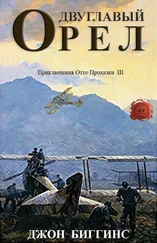“Res facilis est,” he said, grinning that disturbing smile of his. “I slow down, then start to spin . . . so.” He held out his arms then dropped to one side suddenly. “Gemein Flieger—aviator vulgarus—try to bring his wing up, so. But his wing is already stalled, so it only makes worse. Nihil bonum est.” He shook his head. “But I allow the aeroplane to spin a few times, make the controls central, then work the rudder: gubernaculum dexter sinister dexter, so. Then no more spin.” He grinned broadly.
“I see,” I said, “and did you discover this yourself?” “Gehorsamstmelde jawohl, Herr Leutnant. Inveniego ipse. Zugs- fuhrer Toth Magyarus est . . .” He tapped the side of his head. “He has good brain—cerebrum bonum habet, nicht wahr?”
I considered this for a while, then called over a Hungarian sergeant who was working on our aeroplane. I was far from sure how much German Toth understood, since he spoke it so villainously, and I wanted there to be no ambiguity about what I said. I also admit that sixteen years after leaving school I had no great confidence in my own ability to compose impromptu Latin orations. The sergeant agreed to act as our interpreter, so I was able to have my say in German.
“Very good, Toth. It is my considered opinion, after having flown with you twice, and after what you have just told me, that you are a dangerous madman and perhaps more of a threat to the k.u.k. Fliegertruppe than to the enemy. You have just hazarded our lives and one of the King of Hungary’s aircraft by wantonly engaging an enemy single-seater in direct disobedience to my orders, while a few days before, on your own admission, you tried to kill the pair of us by deliberately putting us into a spin. I could have you court-martialled on both counts if I were so minded. However, it seems to me as a qualified pilot myself that you are an exceptionally talented flier, and that the system of my telling you how to fly the aeroplane is a remarkably poor one, regardless of whether I give the orders in Latin, German, Magyar or colloquial Hottentot. Therefore I have decided that from now on, as long as we fly together, I shall leave you in effective command of the aeroplane while we are in the air. I shall give you only general instructions beforehand as to where we are to go, and I shall leave it entirely to your own best judgement how we get there. I know that I could be court-martialled for suggesting this, since I am still technically in command of the aeroplane, but I feel that the present system cannot work on active service, and that we must therefore move with the times. However, I will impose two conditions. The first is that you should never breathe a word to anyone about this understanding of ours; the second is that if you feel an overwhelming urge to kill yourself coming upon you, you will be so kind as to tell me first so that I can get out at the next stop. If you really wish to die and leave that charming girl of yours alone in the world then I would suggest either placing a pistol to your head or asking to be posted back to the trenches. Both methods will be cheaper and will not involve me in making out official reports. Now, would you like these remarks of mine in Latin as well? Perhaps on vellum with my official seal attached?”
He grinned, and nodded to signify that everything was perfectly clear as it was. So from that day onwards a historic compromise was struck. Aboard at least one of His Imperial Royal and Apostolic Majesty’s aeroplanes, regardless of what the regulations might say, the man in the pilot’s seat would be the man in charge.
We had to remain at Veldes for the rest of that day while minor repairs were carried out to the Lloyd. The airframe was badly out of joint after our headlong dive and the engine sounded like a chaff-cutter, but Flik 2’s mechanics assured us that they could patch it up sufficiently to get us back home. While we were there, that same afternoon, we received a personal telegram from General Boroevic. He congratulated the two of us in the warmest terms for having made possible the destruction of the Italian battery that had plagued our men for so long.
We landed at Caprovizza early next morning. Hauptmann Kraliczek was waiting for us as we came to a stop and Toth switched off the engine. Our commanding officer was clearly not in a benign mood: in fact he even went so far as to put his foot in the stirrup in the fuselage side and hoist himself up to confront me still sitting in the cockpit. His pallid bespectacled face glowered at me as I removed my flying helmet. I saluted.
“Good morning, Herr Kommandant. Up early I see. And in what may I perhaps be of service to you?”
“Prohaska, I want to know the meaning of this.”
I smiled. “Of what, Herr Kommandant?”
“You know perfectly well what I’m talking about: your damned disobedience to orders.”
“Begging your pardon, to what disobedience can you possibly be referring, Herr Kommandant? Zugsfuhrer Toth and I carried out our assignments to the letter . . .”
“Damn and blast you both, I could have you court-matrialled and shot for cowardice! Your orders were to proceed to the scene of action over the enemy side of the lines and to return by the same route, not skulk in safety behind our lines. You are guilty of avoiding contact with the enemy, that’s the truth of it.”
I breathed deeply and tried to count up to ten: the temptation to use violence against a brother-officer was overwhelming.
“Herr Kommandant, I choose to ignore your accusations of cowardice: so far as I understand the term, skulking is something that one does in Kanzlei huts, not in the air. As to your orders for us to proceed to Monte Nero to the west of the lines, they were not clearly expressed and I chose to interpret them as seemed most sensible at the time. If you care to examine this map you will see that the most direct route from here to the operational area keeps us well to the east of the trench lines almost all the way. I could see no point whatever in risking our mission by flying unarmed over Italian territory.” He fairly exploded at this, spluttering with all the fury of a damp firework.
“Not see any sense in it? Who are you to question orders, you degenerate! The whole point of a long-range reconnaissance unit is to fly as many kilometres as possible over enemy territory. You would have added at least a hundred kilometres to our total for August!”
“I see. Might I obediently enquire, then, whether we could bring forward some kilometres on account from September? Or perhaps borrow some unused kilometres from another unit if it helps balance the books? I know for a fact that Flik 4 at Wippach have been grounded for most of July. Surely they would help us out if we asked nicely . . .”
“Be quiet! And there’s the matter of your shooting down an Italian aeroplane, clean contrary to your orders not to engage the enemy . . .”
“. . . By your leave, Herr Kommandant, the enemy engaged us, not we him. And incidentally, we didn’t shoot him down: he tried to follow us into a dive and broke up in mid-air.”
This information seemed merely to enrage Kraliczek even further— so far as I could gather on the grounds that destroying enemy aircraft without the aid of bullets would make nonsense of his monthly returns for expenditure of ammunition. At last he recovered himself sufficiently to speak.
“Herr Linienschiffsleutnant, you are henceforth sentenced by me as your commanding officer to a week’s confinement to this airfield. As to your pilot here—five days’ solitary arrest on bread and water! Abtreten sofort.”
He turned to leave. I called after him.
“Oh, Herr Kommandant.”
He turned back irritably. “What do you want?”
“I thought that you might like to see this.” I rummaged inside the breast of my flying jacket. “It’s a telegram of congratulation to us from a fellow who claims to be commanding the 5th Army, a chap called Boroevic or something like that. I thought that you might perhaps care to read it out to the assembled ranks on parade this morning.”
Читать дальше












